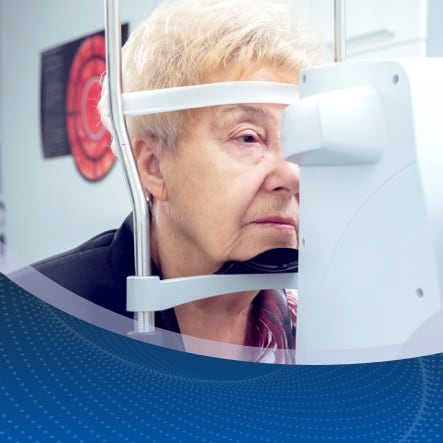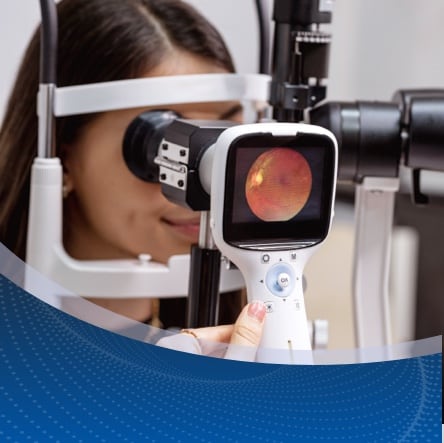Reviewed By: Paul M. Griffey M.D.
Yes, Medicare does cover cataract surgery if it’s deemed medically necessary. Medicare Part B typically covers the procedure and a standard intraocular lens (IOL). However, patients may still be responsible for deductibles and 20% coinsurance unless they have supplemental coverage like Medigap or a Medicare Advantage plan.
To better understand what’s covered and how Medicare works in this case, let’s take a closer look at what cataracts are, their symptoms, and how Medicare plans differ.
When we age, some of our bodily functions start to slow or break down. That includes the organ we rely on the most for sight, brain focus, and storage/transference of information: the eyes. Around the age of 40, the proteins weaken and become cloudy in the eye’s natural lens. By age 65, one in five people has developed cataracts. By age 75, it’s one in two.
Sometimes, impaired vision due to cataracts can be improved with a stronger eyeglass prescription. Other times, surgery is the only option to regain clear vision.
Table of Contents
What Are the Symptoms of Cataracts?
Common symptoms include:
- Cloudy or blurry vision
- Light or glare sensitivity
- Trouble seeing at night
- Halos around objects
- Needing brighter than normal light to see or read
- Faded or yellowed vision
- Headaches
- Eye pain
What Causes Cataracts?
Cataracts are not only a result of aging—they can also form from a variety of different causes:
- Increased UV exposure
- Eye injury
- Genetics
- Long-term steroid use, like eye-drops
- Past eye surgery
- Smoking
- Obesity
- Certain medications
- Diseases like myotonic dystrophy, a genetic disorder that causes muscle weakness
- High blood pressure
Learn more about what increases your risk of cataracts here.

Worried About Cataract Surgery Costs? We Can Help!
Medicare may cover your cataract surgery, but costs and coverage vary. Get a clear understanding of what’s covered and your out-of-pocket costs.
- Understand Medicare coverage for cataract surgery
- Explanation of deductibles and coinsurance
- Lens choices and the impact on your coverage
How is Cataract Surgery Performed?
One of the most commonly performed surgeries in the United States, cataract surgery changes the lives of about 2 million people annually. The cloudy lens is removed and replaced with a clear, artificial lens during surgery.
Eye doctors (ophthalmologists) perform cataract surgeries on an outpatient basis, which means overnight hospital stays are not required. It is a quick, effective, and safe procedure. However, is cataract surgery covered by Medicare? Yes! But it depends.
Types of Medicare
Medicare was formed in 1965 to act as a federal health insurance system for people 65 years or older to remediate specific disabilities. It covers the costs of various medical services like doctor visits, hospital stays, and prescription drugs. However, Original Medicare coverage depends on multiple factors. Popularly, Medicare Part B approves Medicare coverage for cataract surgery.
Medicare Part B
Medicare Part B offers medically necessary services to treat and diagnose conditions that meet standard medical practices and preventative services for illnesses (like the flu) in the early stages of development. This includes:
- Clinical research
- Ambulance services
- Durable medical equipment (DME)
- Mental Health
- Inpatient
- Outpatient
- Partial hospitalization
- Limited outpatient prescription drugs
Since cataract surgery is a medically necessary and outpatient procedure, Medicare will cover the cost of the surgery and the cost of the intraocular lens (IOL) implanted during the operation. Coverage, however, does not include additional unnecessary fees or upgraded lens options that eliminate your need for glasses following the surgery. Likewise, coverage does not mean the surgery comes to you 100% free; you may need to pay the 20% coinsurance amount and the Part B deductible. But there are other plans you can choose to fill in those gaps.
Medicare Supplement Insurance (Medigap)
Private companies sell Medigap to pay for the costs not covered by Original Medicare. These include copayments, coinsurance, and deductibles. Some Medigap policies even cover services that Original Medicare does not allow, like medical care during travel outside the U.S. However, Medigap still doesn’t cover everything, like long-term care, vision or dental services, hearing aids, eyeglasses, and private-duty nursing. Explore the benefits on the official Medicare website here.
Medicare Advantage (Part C)
Medicare Advantage, or Part C, is an all-in-one Medicare alternative to Original Medicare. Private companies sell this plan and bundle Part A (hospital coverage), Part B (doctor and outpatient services), and sometimes Part D (prescription drug coverage) all into one plan. See if this plan is right for you on the official Medicare website here.
How Do I Apply for a Medicare Plan?
Medicare plans typically have an enrollment period from October 15 to December 7 on the Medicare website. During those dates, you can choose which program works best for you. If you know you will need cataract surgery in the future, analyze your options for the best coverage. Even if a plan has a higher monthly cost, it may be worth more to you in the long run.
When signing up for Medigap, the best time to enroll is during your six-month enrollment period, which begins after signing up for Original Medicare.
Frequently Asked Questions (FAQs)
At Griffey Eye Care and Laser Center, we receive many questions regarding cataract surgery. With over 50 years of combined experience, our patients can expect expert, world-class service close to home in any of our prime Chesapeake locations. Here are some of the most common questions regarding Medicare coverage for cataract surgery:
Q: What type of lens does Medicare cover for cataract surgery?
A: Cataract surgery covers a conventional intraocular lens (IOL), a small, clear disc that replaces the damaged eye lens. In our practice, this is called Basic Vision, which will require the use of glasses after surgery.
Q: Does Medicare pay for cataract surgery with astigmatism?
A: Medicare does not cover a cataract surgical procedure to correct astigmatism because it is not medically necessary. Alternatively, you can choose more advanced IOLs, like multifocal lenses or toric lenses, which improve vision at multiple distances with reduced astigmatism and other benefits. When selecting an upgraded lens, you will need to pay the difference out of pocket.
Q: Does Medicare cover cataract surgery for seniors?
A: Yes, Medicare covers cataract surgery for seniors if it’s medically necessary. Part B typically includes the procedure and a standard intraocular lens (IOL), but patients may still owe a deductible and 20% coinsurance unless they have supplemental coverage like Medigap or Medicare Advantage.
Q: Does Medicare pay for glasses after cataract surgery?
A: Yes, Medicare covers one pair of glasses with standard frames or contact lenses prescribed by your Medicare-approved doctor after cataract surgery.
Don’t let cataracts compromise your quality of life. At Griffey Eye Care, we assist in restoring your clear vision. Book an appointment or take our online assessment to determine if you are experiencing the symptoms of cataracts.
Read About: Can Cataract Surgery Be Redone?
**Please note that the suggestions provided in this blog are for general informational purposes only and may not be suitable for your specific insurance plan and cataract needs. It is important to consult a qualified healthcare professional for personalized advice and treatment.













